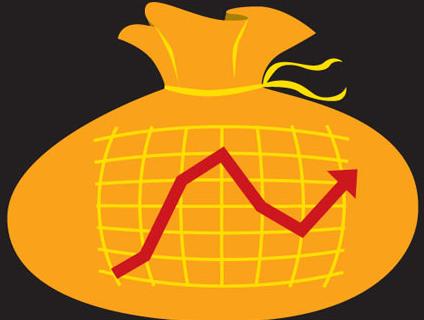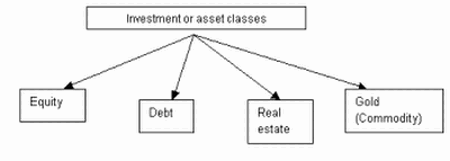
Welcome to the world of investments. How many of you can confidently say that you are well aware of all the investment avenues available? Not all. There is a plethora of investment options available in the market today. But then the options must be selected based on the goals you want to achieve in life and the time frame in which you want to achieve it.
Let us take a trip down the different paths of investment world.
This is the first part where in we will explore different options available under equities:
Equity
I guess one of the most talked about asset class in recent years. So what is equity investment? It refers to buying and holding of shares or stocks in a stock market by an individual and funds in anticipation of income by way of dividend and capital gain as the value of the stock rises. Equity investment is a good form of long-term investments. There are various ways of investing in equity:
Direct investment: Refers to buying and selling (trading) in the stocks or shares on the exchange. In order to trade you need to have a demat account. As for trading you need to register with a broker or you can have an online trading account which is linked to your demat account and your bank account through which you can trade.
This form of investment in equities is for investors who regularly follow the stock market. Investors who are looking for developing long-term wealth should not indulge in speculative trading (buying and selling within a short span of time). Also investments in stocks or scripts should not be done based on tips that you have received from your friendly neighbor or relatives.

Investment should be done after a thorough analysis of the company, sector, and industry on the whole. We have heard many stories where people have lost their entire wealth by investing based on tips. Also do remember, one can never time the market. So be careful when you are investing directly.
Portfolio management services (PMS): In return for a fee, trained professional portfolio managers allocate your assets in various asset classes depending upon your personal investment goals and risk preferences. PMS is not restricted to only investing in equity and equity mutual funds. They also include investment in bonds. The advantage of this form of investment: professional expertise for your hard earned money, transparency and flexibility. You do not have to overlook in the day-to-day management. You are given an online user name and password that grants you an online access to your portfolio that keeps you up to date. The fee structure can also be selected either on performance or on a fixed basis.
The disadvantages: the minimum requirement for PMS is generally very high, that is., most of the PMS are offered where the portfolio offered to manage is at least Rs 25 lakh. The fee charged is also high. Generally losses are not shared when you opt for performance-based fees. This form of investment is especially good for high net worth individuals who have money but no time to monitor them.
The author is a certified financial planner and can be reached at dhanplanner@rediffmail.com

Equity mutual fund: Mutual fund is the latest buzzword. After the debacle of US 64, the mutual fund industry took many years to get their act together. But now with stricter norms set by SEBI and more transparency mutual fund industry has developed in a big way. With more than 500 funds there are options available for each and every investor. Also, with investment of as low as Rs 1,000 (for systematic investment plan) and Rs 5,000 (lump sum investment) this form of investment attracts one and all.
So what is a mutual fund? A mutual fund is professionally managed collective investment scheme that pools money from many investors and invest it in stocks, bonds and various others securities and instruments. Mutual funds are divided into open ended and closed ended mutual fund.
Open-ended fund: Are funds in which you can buy or sell on any business working day. Just like shares value, mutual funds have net asset value on which you buy or sell your units. Unlike shares in mutual funds, units are allocated to an investor for the amount invested.
Closed-ended fund: Is a collective investment scheme where limited a number of units are allocated. New units are not allocated on a day-to-day basis. Generally closed-ended funds are traded on the exchange and one can trade their units on the exchange.
In this section, we will have a look at various forms of open-ended equity mutual funds. Equity mutual funds are sub-divided into:
Diversified equity mutual fund: A kind of mutual fund which invests in stocks of various companies of various sectors. Best bet to park your funds in.
Sector funds: Mutual fund whose investment objective is to invest stocks of companies of a particular sector like automobiles, pharma, banking, infrastructure and others. This type of fund can be risky if the sector does not perform well. So limit your exposure to sector funds.
Index fund: A type of mutual fund with a portfolio constructed to match or track the market index. It is relatively passive fund with broad market exposure and low operating cost.
Tax savers or equity linked saving schemes (ELSS): They are same like diversified mutual fund. The difference is investment in these funds have tax benefit up to Rs 1 lakh as it is exempted under section 80C. Also, ELSS has a three year lock-in period. Any withdrawal before this period means that you will not get the tax benefit under section 80C. Do keep in mind the risk factor while opting to invest in ELSS. Also, select growth or dividend payout option but not dividend reinvestment as dividend reinvestments go into the lock in period loop.
Why select mutual fund? Here's why. Low minimum investment amount, low management cost, low investment, professional management, diversification, liquidity and with entry load removed from August 1, 2009 make them all the more attractive.
Disadvantage of mutual fund: Backend load or exit load if investment redeemed within six months to one year. Many funds have high operating charges, decision-making is in someone else's hands and no tailor made portfolio.
The pros outweigh the cons and hence equity mutual funds form a very attractive form of investments. Mutual funds are especially for investors who do not have the time to follow the market and also who cannot shell out huge amounts. It is advisable to do a SIP in mutual funds as power of compounding and cost averaging works wonders to your hard earned money.

Derivative refers to a variable that has been derived from another variable. They have no value of their own. They derive their value from some underlying asset. For example a derivative of a share of Reliance Industries will derive its value from the share price of Reliance. Derivatives are specialised contracts wherein an agreement or an option to buy or sell the underlying asset of the derivate up to a certain time in the future at a pre-arranged price which is known as exercise price. The contract has a fixed expiry period between 3 to 12 months.
The value of the contract depends on the expiry period and on the price of the underlying asset. The underlying asset in derivative trading can be financial assets like shares, index, currency or can be commodities like soyabean, oil and others. We will right now be looking only at financial derivative trading whose underlying asset is equities.
The different forms of derivative contracts are:
Futures and forwards: Futures contract give the holder the opportunity to buy or sell the underlying asset at a pre-specified price some time in future. These contracts come in standardised format with fixed expiry date, time contract size and price. Forwards are similar contracts like future but the size, expiry date and price are customised as per the needs of the user.
Options: It is a contract that gives the buyer the right, but not the obligation, to buy or sell an underlying asset (it maybe an index or a stock) at a specific price on or before a certain date. The right to buy an underlying asset is known as call option. The right to sell the underlying asset is known as put option.
Financial derivative contract can be bought or sold by paying a premium. The upside in a derivative contract is unlimited. But again if you are a buyer of an option, your downside is limited up to the extent of the premium amount paid (Note: The seller of an option has an unlimited loss potential).
Futures and forwards too have an unlimited loss potential.
The advantages are you need to pay only 20 to 30 per cent of the contract price. You also have the option to first sell the lot of stocks and then buy them within the stipulated time. This is only possible in normal equity trading if you are an intra-day trader.
The disadvantage is there is a time frame to the contract. Not all the stocks are available in derivatives trading. Finally they are complicated and extremely risky.
Only investors who have a thorough knowledge of derivative trading and who can regularly follow the stock market should trade in them. It is not for investors who are looking to develop long-term wealth.
Who should be investing in equities?
Investors whose goals are long term, that is, more than seven years can invest comfortably in equities. As aptly said by Warren Buffet: If, when making a stock investment, you're not considering holding it at least ten years, don't waste more than ten minutes considering it.
If you want to achieve any of your goals in less than this time frame then equity is not the vehicle for you. Remember that emotions like greed and fear should have no place when investing in equities. Otherwise debt is the avenue for risk-averse safe fixed income generation. This will be covered in the next section.